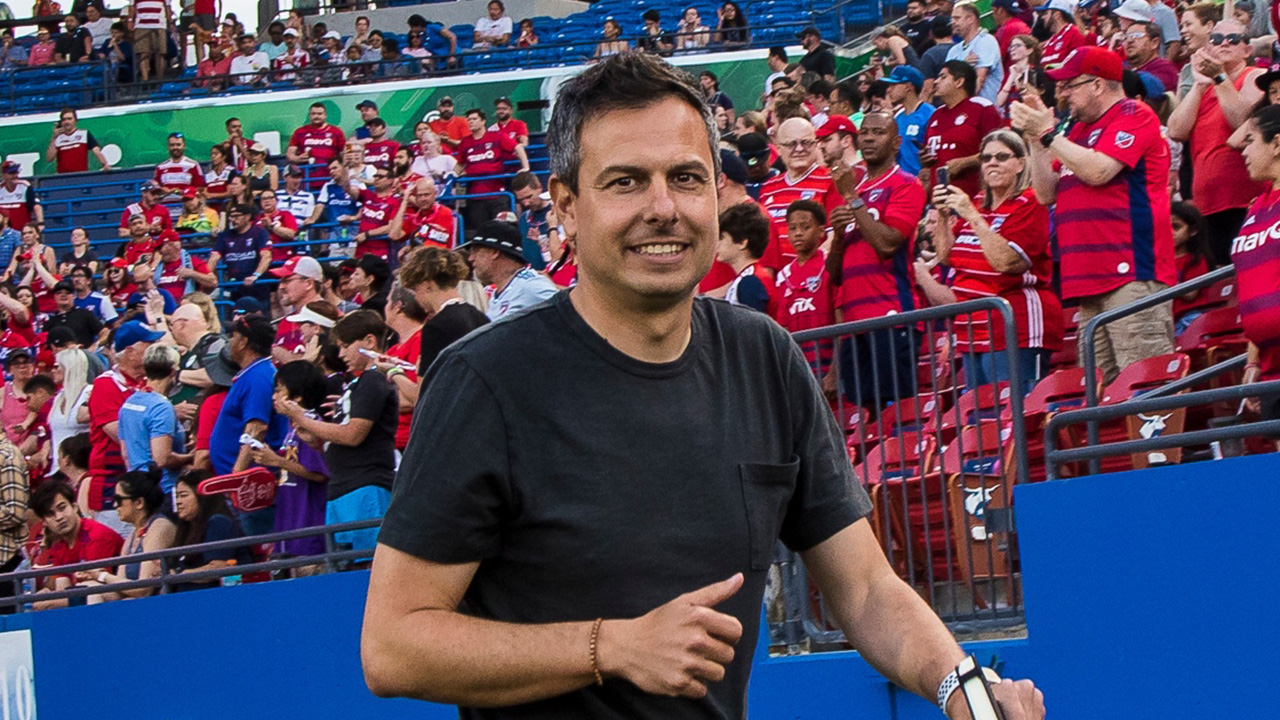
Nico Estévez of FC Dallas
Getting one young soccer player from the Academy level to the pros is hard enough. Turning an entire Academy into a conveyor belt of professional talent good enough not only to supply a first-division team with talent but also to become the base of the United States men's national team? That's even harder.
Yet, that's what FC Dallas has done, producing more than a half-dozen regulars for the Stars and Stripes ahead of the 2022 World Cup. Getting to that point has taken trust, knowledge and expertise.
The pipeline from Academy to pro squad runs so deep that multiple leaders who put down the foundation now have moved on to other opportunities, but FC Dallas continues apace.
"Our business here at FC Dallas is ever-evolving, ever-changing," said FC Dallas President Dan Hunt, who recalled when the club had 44 full-time employees as they opened one of MLS' first-ever soccer-specific stadiums. The organization now has "more than 130 employees and is headed toward 200."
The Gallagher partnership
As a partner of FC Dallas, Gallagher is part of the initiative to grow soccer in America, with a focus on designing and presenting programs that celebrate diversity, equity and inclusion (DEI).
Hunt said, "I'm proud of Gallagher's commitment to the DEI world. It's a company that cares, that has the social responsibility that so many places are still lacking today.
"It's nice to have a company and association with a major brand and somebody you know whose core values are so good," Hunt said. "It's a company we know we can rely on."
With the trust that family-focused style of leadership engenders, the knowledge of what it will take to succeed and the expertise to actually make it happen, both FC Dallas and Gallagher are looking to a future that will lead to even more positive results on and off the field.
Coaching for confidence
New first-team manager Nico Estévez, who arrived in January of 2022, is using his own leadership techniques while working within the established structure to continue developing players. Those rising stars not only will become FC Dallas regulars, but also may become international-level players and perhaps even make the jump to a historic club in one of Europe's top four leagues.
"We try to improve every player who is on the roster," Estévez said. "We conduct a lot of individual meetings, we watch a lot of video, we talk on the field, we have discussions on the field and in trainings.
"These conversations, this openness to talk and discuss things, help the players to be better."
Of course, players can't reach their ceiling without a strong belief in themselves, and Estévez works to instill that faith in the members of his squad. He says a player "needs to feel the confidence from the coach" and not be weighed down by the fear of making a small, correctable error.
"Sometimes players feel a lot of responsibility, and this can make them underperform. I try to give them confidence, tell them it is normal to make mistakes. That's something that I can deal with. That is not a problem for me," the manager said. "I just want to see them enjoying the game, being happy and giving everything that they have."
Helping new players adapt
While FC Dallas has become the United States' top producer of young talent, no team can compete for trophies without a few additional reinforcements. Risk is inherent in the scouting process, with soccer teams often spending millions of dollars to bring in players from abroad.
Technical director Andres Zanotta is responsible for signing new recruits. He knows he and his staff must make sure the newly signed players complement the players already on the team and are prepared to adapt to their new workplace — often in a country where they may not speak the language or understand the culture.
"Before signing a player, to minimize the risks and to have a better understanding of the player's behavior and character, we always speak with former coaches, sporting directors, teammates and people that dealt with the individual daily," Zanotta said.
"Once the player comes to Dallas, we need to help him in every way we can to make his adaptation as smooth as possible."
That's where the team's Player Care department comes in, assisting players in finding a place to live or making sure their children are in a school that suits their needs.
Zanotta must be sure a new addition can be relied upon, not only by their teammates but also by the backroom staff members who make the organization run, saying, "personnel management is the main component" of his job.
"I need to help them fit in our environment and the club's culture," he said. "We have this true sentiment of family in FC Dallas, and we must take care of each other. I want players and staff to trust that they can come to me to share any issues and I will do my best to solve it."
Inspiring with leadership
The same mentality exists in the locker room, where Estévez worked to create a collaborative approach early in his tenure and has seen strong results on the field — in no small part because of that leadership strategy.
Estévez sees leadership is "a way to inspire others" and in his first-ever head coaching job, he's looking to lead more with his actions than with words — though his halftime speeches and adjustments already have sparked a number of second-half rallies.
Those moments on the field often can be traced back to the foundational tenets put in place long ago, as FC Dallas started investing in the stars of the future by using its organizational knowledge to develop young players into world-class pros.
